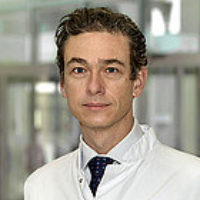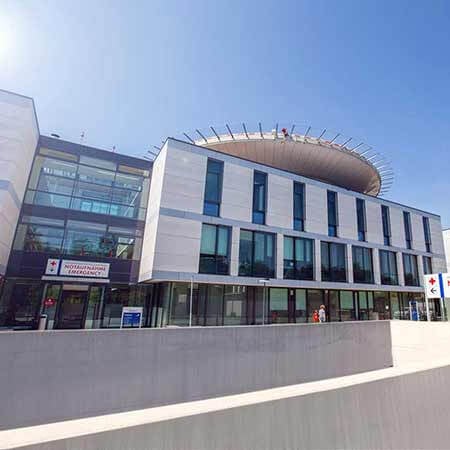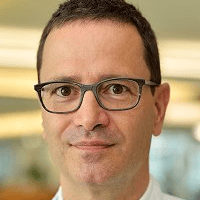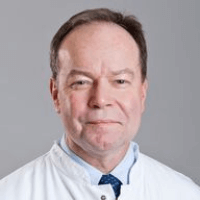Stereotactic Biopsy for Diagnostic of Brain Astrocytoma in Germany
Treatment prices are regulated by national law of the corresponding countries, but can also include additional hospital coefficients. In order to receive the individual cost calculation, please send us the request and medical records.

Department of Adult and Pediatric Neurosurgery, Spinal Surgery
The Department of Adult and Pediatric Neurosurgery, Spinal Surgery offers all the possibilities of modern surgical treatment for diseases of the central and peripheral nervous system in patients of all ages. More than 6,000 surgical procedures are performed annually in the department's high-tech operating rooms. Both planned and emergency neurosurgical procedures are performed here. The department's surgical team focuses on patients with cerebrovascular diseases, brain and skull base tumors, spine and spinal cord diseases, cerebrospinal fluid circulation disorders, and pathologies of the peripheral nervous system. The department's team of physicians also has extensive experience in functional neurosurgery: specialists perform deep brain stimulation for movement disorders, spinal cord stimulation for back pain, and vagus nerve stimulation for epilepsy. The department works closely with neurologists, radiologists, and nuclear medicine specialists to provide patients with the highest level of comprehensive medical care. The department is recognized as one of the top neurosurgical centers in Germany and beyond, as evidenced by consistently high treatment success rates and numerous quality certifications, including the German Cancer Society (DKG) Certificate, the German Spine Society (DWG) Certificate, and the Leading Medicine Guide Certificate.







Department of Adult and Pediatric Neurosurgery
The Department of Adult and Pediatric Neurosurgery offers the full range of surgical treatment of diseases of the brain, spine, spinal cord and nerves in adults and children. The department keeps pace with new trends in medicine, as well as contributes significantly to their development. Therefore, the most modern diagnostic and therapeutic methods are available here. An individual approach to each clinical case is crucial to ensure optimal treatment results with the preservation of all neurological functions.


Department of Adult and Pediatric Neurosurgery
According to the Focus magazine, the Department of Adult and Pediatric Neurosurgery ranks among the top German medical facilities specializing in the surgical treatment of brain tumors! The department offers the full range of diagnostics and surgical treatment of diseases of the central and peripheral nervous system. A specially trained team of pediatric neurosurgeons provides treatment for various neurosurgical pathologies in children. During the treatment, the doctors use state-of-the-art equipment, in particular, imaging-guided neuronavigation, functional imaging (fMRI), intraoperative mapping, intraoperative videoangiography, etc.






A brain biopsy is an invasive procedure that is used to diagnose an astrocytoma. Its goal is to obtain a tissue sample, which can then be examined to determine the histological type of the tumor and detect mutations in the genes. In Germany, stereotactic biopsy is informative and safe. It is performed by experienced neurosurgeons using modern stereotactic and neuronavigation systems.
Diagnostic principles
As a rule, it is not difficult to detect a brain tumor. This can be done not only with the help of CT and MRI scans. If a neoplasm of the central nervous system is large enough, it can be visible even on a simple X-ray image.
It is much more difficult to obtain additional information about the brain tumor, which is necessary for treatment planning. The doctor needs to clarify:
- Histological type of the neoplasm
- Grade, growth rate, metabolic activity
- Precise localization and relationship with important anatomical structures of the brain
- Mutations in genes (determines the prognosis and response to drug treatment)
Most tumors in the human body require a biopsy to be diagnosed. Doctors sample a piece of tissue in order to understand whether it is cancer or a benign neoplasm, to determine the histological and molecular biological type.
However, it is much more difficult to obtain a fragment of the brain tumor. This procedure requires breaking the integrity of the skull and introducing the instrument into the brain. There are certain risks associated with astrocytoma stereotactic biopsy. Therefore, it is not used in all patients with cancer of the central nervous system.
Most patients do not require a stereotactic biopsy for disease detection, since astrocytoma can be detected using magnetic resonance imaging. The standard diagnostic method is MRI with intravenous contrast medium enhancement. The procedure provides information about the size of the tumor, its location, shape and boundaries. The histological type of the neoplasm can also be determined with high reliability from the MRI scans.
Some patients have contraindications for the MRI. For example, some people may have metal implants in their bodies, live with artificial heart pacemakers, etc. In such cases, a CT scan is carried out, and if the information obtained is insufficient to make a decision about the preferred treatment method, an astrocytoma stereotactic biopsy will be performed.
Clarifying diagnostic interventions
The most detailed information about cancer the doctor receives from MRI. In addition to the standard diagnostic with intravenous contrast medium enhancement of astrocytoma, the well-equipped neurosurgery clinics use additional diagnostic procedures with nuclear magnetic resonance. These are the magnetic resonance spectroscopy, functional MRI, magnetic resonance angiography and venography.
Magnetic resonance spectroscopy. It allows the doctor to distinguish astrocytoma from non-neoplastic diseases of the brain. In patients who are being diagnosed for the first time, there may be a need for a differential diagnostic of a neoplasm with an inflammatory process in the brain. In the case of suspected relapse of astrocytoma after previous treatment, a recurrent tumor can be mimicked by a scar left after surgery, or a zone of radiation necrosis after radiation therapy. In addition, MR spectroscopy provides information on the metabolic activity of the astrocytoma, its growth rate, grade, as well as helps to assess the prognosis of the disease.
Functional MRI. It is usually performed before surgery or astrocytoma stereotactic biopsy: the astrocytoma is sometimes located in a hard-to-reach place, so an invasive intervention can cause complications due to damage to healthy nerve tissue. Functional MRI provides information about the location of functionally important areas of the brain. Based on this information, the point of introduction of the needle and the trajectory of its movement towards the tumor are planned.
Magnetic resonance angiography and venography (MRA and MRV). The techniques are aimed at assessing the blood supply to the tumor. Prior to surgery, a neurosurgeon can find out which vessels supply blood to the astrocytoma. The best possible preservation of blood vessels is necessary to reduce the risk of complications associated with impaired blood circulation in the brain tissue after surgical treatment.
In some hospitals, positron emission tomography of the brain is used instead of magnetic resonance spectrography. PET can be used in patients with contraindications for the MRI.
Indications for stereotactic biopsy of the brain
Most patients do not need the stereotactic biopsy, since astrocytoma can be detected using MRI. A sample for histological analysis will be obtained after its removal. However, here are some cases when it is recommended to perform the procedure:
- Suspected lymphoma
- If the operation to remove the astrocytoma is not planned
- When non-invasive diagnostic methods cannot determine whether the neoplasm found in the brain is a tumor
Lymphoma is the only group of tumors in the central nervous system that cannot be removed surgically. If suspected, a biopsy is performed. Should the diagnosis be confirmed, the patient will start chemotherapy.
The astrocytoma stereotactic biopsy is required if the patient will not undergo radical surgical treatment. Here are some of the main clinical situations when this is possible:
- Advanced tumors – very large, aggressive and fast-growing, multiple astrocytomas
- Contraindications for surgical treatment, such as concomitant diseases, elderly age and poor general health state
- Refusal of surgery, including in favor of radiation therapy
Based on the results of the biopsy, the doctor accurately determines the histological type of the neoplasm. The samples are also sent for molecular biological testing: the astrocytoma may have gene mutations, which affect the prognosis and treatment regimen.
How is the stereotactic biopsy performed?
A classical version of the brain biopsy involves the use of a stereotactic frame. Some German hospitals perform the procedure using a frameless method. To determine the coordinates of the tumor and calculate the trajectory of the needle, a neuronavigation system is used.
When using a frame, the procedure begins by adjusting it to the patient's head. The frame is fixed with screws to the periosteum. This manipulation is performed even before the patient is under anesthesia, and therefore local anesthesia is used for pain relief.
This is followed by an MRI scan, if necessary, a CT scan. Based on the data obtained, the system calculates three-dimensional coordinates on an individual basis, determines the best area for needle insertion, the shortest and safest trajectory for its forwarding to the tumor. According to the calculations of the system, a stereotactic arch is assembled on the frame.
This is followed by the biopsy itself. The essence of the procedure is the same for diseases of different origins. A hole about 4 mm in diameter is drilled in the skull, and the dura mater is coagulated. A biopsy needle is inserted into the hole. The doctor receives samples of about 1 cubic centimeter from 2 to 3 sites of the astrocytoma. He samples tissue from the peripheral area of the tumor, since the necrosis zone is often located in the center.
Why is it better to undergo the brain biopsy in Germany?
German medicine is considered one of the best in the world. This is evidenced by the fact that life expectancy in Germany is the highest in Europe.
It is better to undergo diagnostic procedures in one of the German hospitals for several reasons.
1. Accurate non-invasive diagnostic interventions. The doctors carefully examine the patient using CT, MRI, PET scans. The very latest techniques provide accurate information about the location, shape and type of the tumor. In many cases, the diagnosis is made even without the brain biopsy.
2. Safety of the procedure. The diagnostic or treatment procedure is carefully planned using modern stereotactic systems. The doctors use techniques that identify functionally important areas of the brain and avoid damage to them during the biopsy.
3. Minimal risk of error. The inexperienced doctors may not get enough tissue, or they may take samples incorrectly. The tumor may be displaced under the pressure of the needle, or the neurosurgeon may take samples from the central zone of the astrocytoma – the tissues in this area are often necrotized, so their examination is not informative. The leading hospitals in Germany employ the highly qualified specialists, so the risk of such errors is close to zero.
4. Modern technologies. The hospitals in Germany use the very latest stereotactic systems. Many hospitals use frameless stereotaxis: the coordinates of the tumor and the trajectory of the biopsy needle are calculated using a neuronavigation system. This procedure is better tolerated by patients, since it does not require fixing the frame to the head with screws.
5. Low cost of treatment. The prices in Germany are higher than in developing countries. Nonetheless, when compared with countries with the level of medicine equal to that in Germany, then the prices here are quite affordable. For example, the treatment in the United States or Japan is much more expensive.
Diagnostic procedures and treatment in Germany with Booking Health
You can travel to Germany for the highest level of medical services. The Booking Health website provides information about the main hospitals in this country, doctors, prices for various procedures. You can compare the cost of treatment in different hospitals and book the medical program at the best price.
Booking Health will help not only to reduce the cost of treatment abroad, but also to organize your trip to Germany. We offer the following services and benefits:
- Selection of the hospital that specializes in the diagnostic and treatment of astrocytoma of the brain
- Direct communication with the doctor of the Department of neurosurgery
- Reduced waiting time for the stereotactic biopsy and making an appointment on the most suitable dates
- Reduced cost of treatment – treatment prices are reduced due to avoiding additional coefficients for foreign patients
- Up-to-date information about your expenses, the cost of the procedures performed, the funds remaining on the account
- Preparation of a medical program without the need to repeat previously performed diagnostic procedures
- Communication with the neurosurgery clinic after the completion of the medical program
- Buying and forwarding medicines
- Possibility of additional diagnostic procedures or treatment in Germany
The Booking Health specialists provide high-quality service and treatment. We will book a hotel and airline tickets for you, organize your transfer from the airport to the hospital and back.

